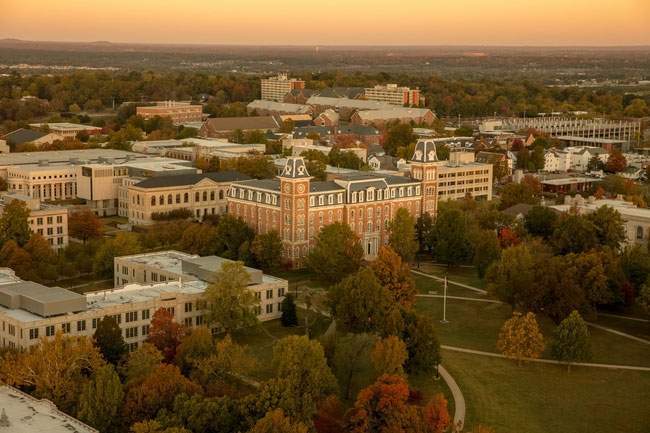The Graduate School of the U of A was founded on May 5, 1927, by the university's Board of Trustees. Its mission of graduate education, research and service to Arkansas remains the same 95 years later, even as it has grown to meet the challenges of each new era.
"With a foundation of excellence and student success, the Graduate School has equipped students for research, entrepreneurship and leadership in a variety of academic disciplines," said Curt Rom, interim dean. "With back-to-back years of record graduate enrollment, we are poised for even greater growth as the university adds degree programs, research facilities and expanding collaborative opportunities within the university and the community."
Creation of the Graduate School came after more than 20 years of slow but steady growth as more faculty members with doctoral degrees joined the university, the number of graduate students slowly rose and the physical needs for proper research were put in place.
Most of that growth happened under U of A President John C. Futrall, the longest serving president of the university, but the graduate programs began while he was still a professor of ancient languages.
Faculty members created a defined, but loose, curriculum for master's degrees that entailed taking upper-level courses, completing research and writing a master's thesis. The first student known to have finished a master's degree, Lucy Byrd Mock, doesn't appear to have written a thesis but possibly wrote journalistic pieces in place of one for her 1905 Master of Arts degree. In later years, she said that her master's degree was in journalism, although the university had no journalism program or courses at the time.
The next year, Leila Ruth Droke earned a Master of Arts in German and wrote the university's first known master's thesis, translating the epic poem "The Legend of Walther of Acquitaine," first written in the 10th century.
Over the next decade, more students pursued graduate degrees and various academic departments developed programs, but numbers remained in the low double digits. By the mid-1920s, though, the number of faculty who held doctoral degrees had grown to nearly 50, and many of the departments now had sufficient labs and library resources to support graduate research.
BUILDING STEADILY
When the Graduate School was created in 1927, John Clark Jordan was named the first dean. Jordan had come to the university nine years earlier after earning a Ph.D. at Columbia University. In 1925, he became dean of the College of Arts and Sciences, present-day Fulbright College. Two years later he moved to the Graduate School dean position.
Futrall reported that 59 students were pursuing graduate degrees in 1927, adding: "Establishment of a graduate school at the university is the outgrowth of the rapidly increasing demand on the part of people of the state for work leading to the degrees of master of arts and master of science. … There is strong evidence that this number will rapidly increase if the proper facilities are offered."
Futrall proved correct. Between 1927 and 1947, the Graduate School grew four-fold to more than 270 graduate students.
African American graduate and law students began entering the university the next year when the university began desegregation. The university's general extension service also started offering graduate coursework at satellite offices in central and eastern Arkansas. More than 140 Black teachers and principals — demonstrating a pent-up demand for graduate degrees — finished master's degrees in education from 1950 to 1954 through the extension coursework. At the Fayetteville campus, the first Black students to earn master's degrees were Benjamin Franklin Lever in 1951, followed by Dorris Tate Hamilton, Dorothy Hoover, Geneva Zenobia Facen and Thomas Clifton Brunson, all earning their graduate degrees in 1954.
DOCTORAL PROGRAMS ADDED
The Graduate School began adding doctoral programs, including a Doctor of Philosophy and a Doctor of Education, in select programs during the 1950-51 school year. For the Doctor of Philosophy, they included the fields of chemistry, economics, English, history for a brief period, and philosophy.
In 1952, William James Broach earned the university's first Ph.D., studying chemistry. And four students — James William Cady, Norval Denver Hazelbaker, Jesse Dee Henry and Wanda Hollingsworth Walker — earned Doctor of Education degrees.
Today, the Graduate School offers more than 130 graduate degree programs and has recently developed graduate certificates and microcertificates to help students specialize within their fields.
FORMER DEANS OF THE GRADUATE SCHOOL
- John C. Jordan, 1927-1949
- Virgil W. Adkisson, 1949-1969
- Robert McDermott, 1969-1972
- James J. Hudson, 1972 - 1987
- James H. White, acting dean, 1987-1989
- Lester C. Howick, interim dean, 1989-1990
- David W. Hart, acting dean, 1991
- Collis Geren, 1991-2010
- Todd G. Shields, 2011-2014
- Kim L. Needy, 2014-2020
- Patricia Koski, 2020-2021
Contacts
Curt R. Rom, interim dean
Graduate School and International Education
479-575-7434,
Charlie Alison, executive editor
University Relations
479-575-6731,
